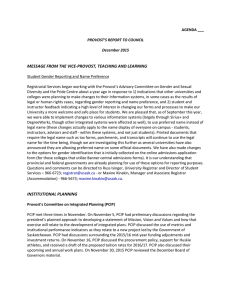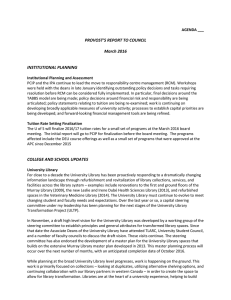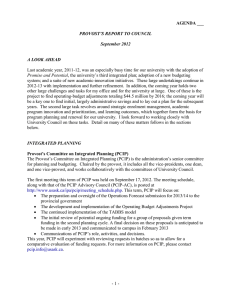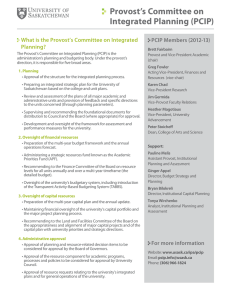PROVOST’S REPORT TO COUNCIL April 2016
advertisement
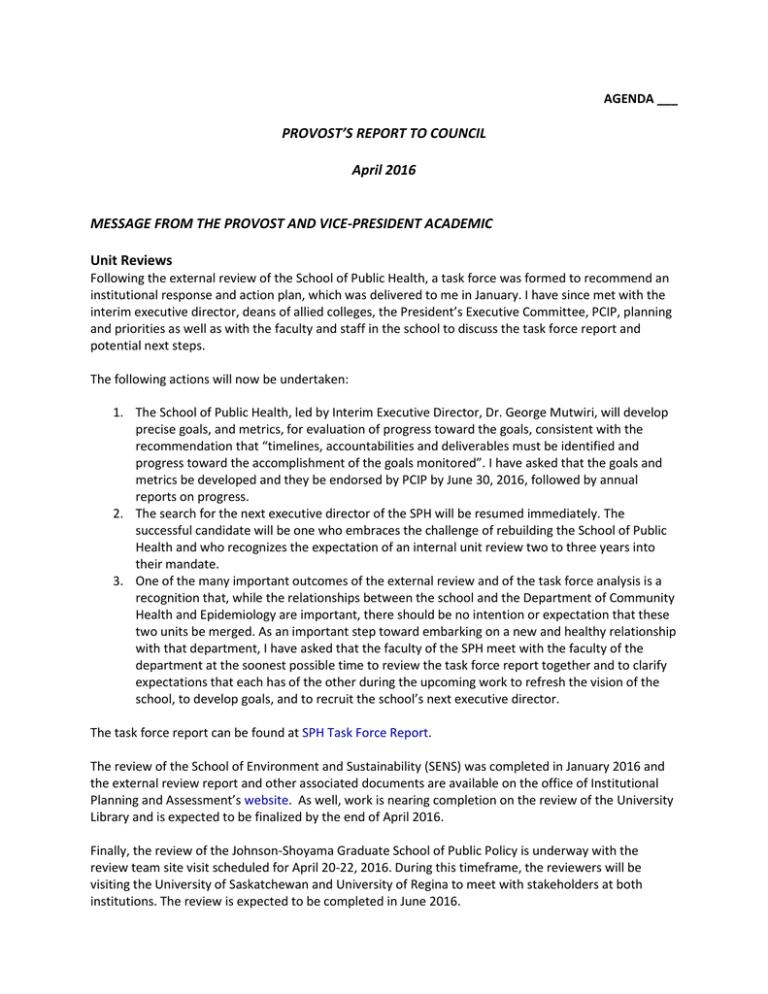
AGENDA ___ PROVOST’S REPORT TO COUNCIL April 2016 MESSAGE FROM THE PROVOST AND VICE-PRESIDENT ACADEMIC Unit Reviews Following the external review of the School of Public Health, a task force was formed to recommend an institutional response and action plan, which was delivered to me in January. I have since met with the interim executive director, deans of allied colleges, the President’s Executive Committee, PCIP, planning and priorities as well as with the faculty and staff in the school to discuss the task force report and potential next steps. The following actions will now be undertaken: 1. The School of Public Health, led by Interim Executive Director, Dr. George Mutwiri, will develop precise goals, and metrics, for evaluation of progress toward the goals, consistent with the recommendation that “timelines, accountabilities and deliverables must be identified and progress toward the accomplishment of the goals monitored”. I have asked that the goals and metrics be developed and they be endorsed by PCIP by June 30, 2016, followed by annual reports on progress. 2. The search for the next executive director of the SPH will be resumed immediately. The successful candidate will be one who embraces the challenge of rebuilding the School of Public Health and who recognizes the expectation of an internal unit review two to three years into their mandate. 3. One of the many important outcomes of the external review and of the task force analysis is a recognition that, while the relationships between the school and the Department of Community Health and Epidemiology are important, there should be no intention or expectation that these two units be merged. As an important step toward embarking on a new and healthy relationship with that department, I have asked that the faculty of the SPH meet with the faculty of the department at the soonest possible time to review the task force report together and to clarify expectations that each has of the other during the upcoming work to refresh the vision of the school, to develop goals, and to recruit the school’s next executive director. The task force report can be found at SPH Task Force Report. The review of the School of Environment and Sustainability (SENS) was completed in January 2016 and the external review report and other associated documents are available on the office of Institutional Planning and Assessment’s website. As well, work is nearing completion on the review of the University Library and is expected to be finalized by the end of April 2016. Finally, the review of the Johnson-Shoyama Graduate School of Public Policy is underway with the review team site visit scheduled for April 20-22, 2016. During this timeframe, the reviewers will be visiting the University of Saskatchewan and University of Regina to meet with stakeholders at both institutions. The review is expected to be completed in June 2016. Report on Enrolment Members of council may recall that we have moved to the practice of providing one detailed report on enrolment in April. The vice-provost, teaching and learning will provide an overview of annualized (yearround) data at the April meeting covering the topics of enrolment targets, student numbers (undergraduate, graduate), and diversity information as well as other items designed to provide a picture of our strategic enrolment management activities. Presentation slides will be made available as part of the minutes. Any questions regarding enrolment can be directed to Patti McDougall (patti.mcdougall@usask.ca). INSTITUTIONAL PLANNING Under the direction of the provost, Institutional Planning and Assessment (IPA) is continuing to consult with deans and college financial officers in the move to Responsibility Centre Management. Duplicate workshops were presented March 21 and March 24. Most deans and many college financial officers attended and there is a sense that definite progress is being made in understanding the logistics and underlying policy of Responsibility Centre Management. It is our intention to have the Transparent Activity Based Budgeting System (TABBS) and Responsibility Centre Management fully implemented by 2017/2018. University Rankings Task Force Report The provost has received a Review of University Rankings, prepared by the University Rankings Task Force with assistance from IPA. The report presents an overview of rankings, briefly highlights the University of Saskatchewan’s performance in the recent past, and presents multiple points for consideration. The considerations are organized into matters relating to U of S’s strategies and plans; processes for providing data; tracking results; and raising awareness. The task force concludes that there is “significant potential for our university to improve in rankings moving forward.” The task force also notes that our strategies and priorities are consistent with metrics tracked by major rankings; so by continuing to pursue our strategies and priorities, our rankings should improve over time. The review is appended to this report. Provost’s Committee on Integrated Planning (PCIP) PCIP is responsible to allocate resources to support the academic priorities of the university. PCIP met twice in March. On March 7, PCIP discussed and approved the implementation of the Relationship Management System which is under the direction of ICT with guidance from the viceprovost, teaching and learning. The potential for the Relationship Management System is far-reaching: initially it will be used to guide the university’s interactions with students from their first identification as a potential student through to maintaining contact with them as they join the ranks of University of Saskatchewan Alumni. Additionally, one-time funding to support the Catalyst Centre at the Wilson Centre for Entrepreneurial Excellence, and the proposed increases to the Residence and Meal Plan Rates for 2016-17 were also approved. In advance of meetings of the Board of Governors, PCIP reviews most board items to assure that they are sufficiently developed for board consideration. On March 14, PCIP reviewed board items including the Relationship Management System, University Library Transformation Phase 3 – Closed Access and Decant Space, RenewUS Office and Research Decant Space and the Biology Building renewal. PCIP discussed the Sport Science Laboratory Space proposal and unanimously supported in principle the development of the laboratory space on the 2nd floor of the new ice facility. COLLEGE AND SCHOOL UPDATES College of Education Think Indigenous Education Conference a Success! The 2nd Annual Think Indigenous Education Conference took place March 16-18th, 2016 in Saskatoon, SK. This conference is hosted by the Indian Teacher Education Program and the College of Education at the University of Saskatchewan. Think Indigenous started off differently this year with a Think Indigenous Youth Day that was supported by Saskatoon Public Schools. The youth day took place at Nutana Collegiate and opened up the opportunity for youth in grades 9-12 to attend sessions presented by current ITEP students, Michael Linklater, and other Indigenous advocates. Youth Day wrapped up with a Powwow at Bedford Road Collegiate. The conference showcased the strengths and attributes of Indigenous education to a wider audience as it hosted attendees from across Canada. It aspires to breakdown some existing misconceptions that may surround Indigenous Education. Keynote speakers at this year's education conference included Indigenous child welfare rights activist Cindy Blackstock, Indigenous human rights lawyer Sharon Venne and University of Regina Education professor Shauneen Pete. Tim Hortons is coming to the College of Education. The University of Saskatchewan Culinary Services will be closing the Education Café permanently this coming April 2016. We will be replacing the current cafe location with a new Tim Hortons which will be located on the main floor of the Education building. Dr. Dirk Morrison has accepted a three-year appointment as the Graduate Chair in Curriculum Studies effective July 1, 2016. Dr. Morrison will oversee both the Curriculum Studies and Educational Technology and Design Graduate programs and work with the new Cross-Departmental PhD program in the College of Education. Dirk has many years of experience advising, teaching, and supporting graduate students. Most recently he served as acting Graduate Chair for the University of Saskatchewan’s Interdisciplinary PhD program. Norm Fleury, College of Education elder and special lecturer was featured in On Campus News, “Living Language". http://words.usask.ca/news/2016/03/04/living-language College of Education programming responds to immigration increase: http://words.usask.ca/news/2016/03/18/college-of-education-programming-responds-to-immigrationincrease/ College of Pharmacy and Nutrition #1 in fundraising and #3 in total research income for all Pharmacy Schools in Canada Our Association of Faculties of Pharmacy of Canada Benchmark data is out and we have moved to #3 in Canada in total research income (#1 in the Prairies ahead of UBC, UofA, Manitoba) and #1 in fundraising (realized donations). Congratulations! Marketing medicine: Collaboration between Edwards School of Business and Pharmacy The most important rule of marketing is to know your audience. That is something Carla Guedo (BSP, 2005), owner of the Medicine Shoppe Pharmacy in Place Riel, learned when she commissioned a team of bright young business students to draft a marketing plan for her. Specifically, the students were a part of professor Barb Phillips’ Integrative Marketing Communications class, a fourth-year course in the Edwards School of Business. Student groups work collaboratively on marketing and advertising plans for a client Phillips chooses— typically a small business or not-for-profit in the community. The students present their thorough plans to the client, who picks the best one—that is, the one the client feels represents their business the best. The plan is then adopted and executed by the client’s business, giving students a taste of the marketing world before they have their degrees in hand. From Phillips’ point of view, a project such as this is an experiential learning opportunity that prepares students for a career in marketing. The kinds of issues they encounter, she explained, such as deciding where to advertise and how much to budget, “are really good because they’re real. And when they graduate, they will be doing those same things. It’s a real-world problem they’re solving.” Rising to the challenge: Winning National Competition A U of S student team recently won top prize at the National Health Care Team Challenge, a Canadawide case competition for students in the health sciences. The team—consisting of students from pharmacy and nursing, nutrition, veterinary medicine and physical therapy, as well as a patient advocate and team advisor—travelled to Halifax for the national competition this past weekend, just six weeks after the provincial competition. The team was ultimately successful in presenting a plan of action that was interprofessional and focused on patient-family centered care. They did this by working collaboratively and applying their skills, knowledge, values and attitudes to their problem-based case. OFFICE OF THE VICE-PRESIDENT RESEARCH The research highlights for the month of April are reported in the attachment by the office of the vicepresident, research.
